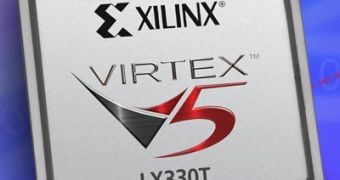Although multi-core processors have made long strides in the last few years it appears that there is quite a long way to go until the technology reaches its full potential as one researcher form the University of Glasgow demonstrated when it built an 1,000 core chip that is 20 times faster than current desktop computers.
Furthermore, the resulting computer was greener than most present-day machines as its processor used far less power than most dual and quad-core CPUs available on the market.
In order to achieve this feat scientists relied on an FPGA chip (Field Programmable Gate Array), this type of processors being used for medical imaging, computer vision, speech recognition or cryptography applications as well as in aerospace and defense systems.
Compared to regular computer processors, FPGA chips can be configured into specific circuits by the user, enabling the team led by Dr Wim Vanderbauwhede, of the University of Glasgow, to divide the transistors in groups each performing a special task.
By creating more than 1000 mini-circuits, the developers were able to turn the chip into an 1,000 core CPU capable of processing around 5GB of data per second.
This makes it approximately 20 times faster than modern computers.
“FPGAs are not used within standard computers because they are fairly difficult to program but their processing power is huge while their energy consumption is very small because they are so much quicker - so they are also a greener option,” said Dr. Wim Vanderbauwhede to DailyMail.
Although this is only a very early proof-of-concept, Dr. Vanderbauwhede thinks these type of chips are to become more common in the future, speeding up computers even further over the next few years.
If everything goes well, the 1,000-core chip developed will be showcased at the International Symposium on Applied Reconfigurable Computing in March next year. (via Ubergizmo)

 14 DAY TRIAL //
14 DAY TRIAL //